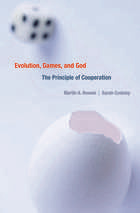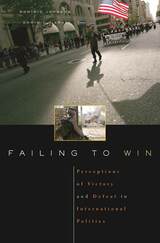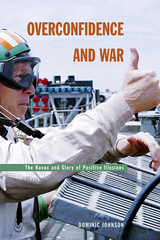
According to the reigning competition-driven model of evolution, selfish behaviors that maximize an organism’s reproductive potential offer a fitness advantage over self-sacrificing behaviors—rendering unselfish behavior for the sake of others a mystery that requires extra explanation. Evolution, Games, and God addresses this conundrum by exploring how cooperation, working alongside mutation and natural selection, plays a critical role in populations from microbes to human societies. Inheriting a tendency to cooperate, argue the contributors to this book, may be as beneficial as the self-preserving instincts usually thought to be decisive in evolutionary dynamics.
Assembling experts in mathematical biology, history of science, psychology, philosophy, and theology, Martin Nowak and Sarah Coakley take an interdisciplinary approach to the terms “cooperation” and “altruism.” Using game theory, the authors elucidate mechanisms by which cooperation—a form of working together in which one individual benefits at the cost of another—arises through natural selection. They then examine altruism—cooperation which includes the sometimes conscious choice to act sacrificially for the collective good—as a key concept in scientific attempts to explain the origins of morality. Discoveries in cooperation go beyond the spread of genes in a population to include the spread of cultural transformations such as languages, ethics, and religious systems of meaning.
The authors resist the presumption that theology and evolutionary theory are inevitably at odds. Rather, in rationally presenting a number of theological interpretations of the phenomena of cooperation and altruism, they find evolutionary explanation and theology to be strongly compatible.

How do people decide which country came out ahead in a war or a crisis? Why, for instance, was the Mayaguez Incident in May 1975--where 41 U.S. soldiers were killed and dozens more wounded in a botched hostage rescue mission--perceived as a triumph and the 1992-94 U.S. humanitarian intervention in Somalia, which saved thousands of lives, viewed as a disaster? In Failing to Win, Dominic Johnson and Dominic Tierney dissect the psychological factors that predispose leaders, media, and the public to perceive outcomes as victories or defeats--often creating wide gaps between perceptions and reality.
To make their case, Johnson and Tierney employ two frameworks: "Scorekeeping," which focuses on actual material gains and losses; and "Match-fixing," where evaluations become skewed by mindsets, symbolic events, and media and elite spin. In case studies ranging from the 1962 Cuban Missile Crisis and the current War on Terror, the authors show that much of what we accept about international politics and world history is not what it seems--and why, in a time when citizens offer or withdraw support based on an imagined view of the outcome rather than the result on the ground, perceptions of success or failure can shape the results of wars, the fate of leaders, and the "lessons" we draw from history.

Opponents rarely go to war without thinking they can win--and clearly, one side must be wrong. This conundrum lies at the heart of the so-called "war puzzle": rational states should agree on their differences in power and thus not fight. But as Dominic Johnson argues in Overconfidence and War, states are no more rational than people, who are susceptible to exaggerated ideas of their own virtue, of their ability to control events, and of the future. By looking at this bias--called "positive illusions"--as it figures in evolutionary biology, psychology, and the politics of international conflict, this book offers compelling insights into why states wage war.
Johnson traces the effects of positive illusions on four turning points in twentieth-century history: two that erupted into war (World War I and Vietnam); and two that did not (the Munich crisis and the Cuban missile crisis). Examining the two wars, he shows how positive illusions have filtered into politics, causing leaders to overestimate themselves and underestimate their adversaries--and to resort to violence to settle a conflict against unreasonable odds. In the Munich and Cuban missile crises, he shows how lessening positive illusions may allow leaders to pursue peaceful solutions.
The human tendency toward overconfidence may have been favored by natural selection throughout our evolutionary history because of the advantages it conferred--heightening combat performance or improving one's ability to bluff an opponent. And yet, as this book suggests--and as the recent conflict in Iraq bears out--in the modern world the consequences of this evolutionary legacy are potentially deadly.
READERS
Browse our collection.
PUBLISHERS
See BiblioVault's publisher services.
STUDENT SERVICES
Files for college accessibility offices.
UChicago Accessibility Resources
home | accessibility | search | about | contact us
BiblioVault ® 2001 - 2024
The University of Chicago Press









